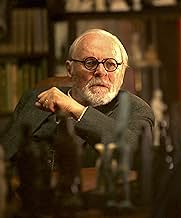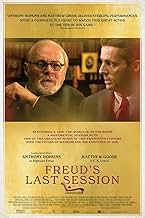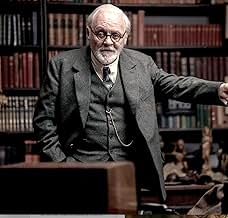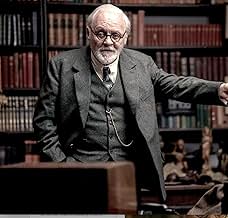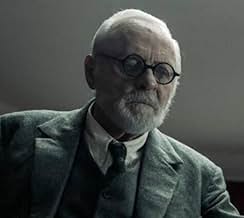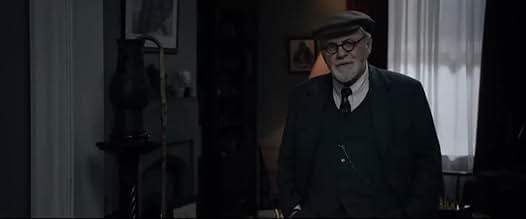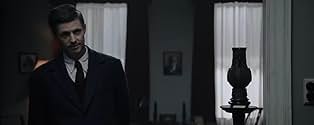O psicanalista Sigmund Freud convida o professor C.S. Lewis para debater a existência de Deus, o relacionamento único de Freud com sua filha e o relacionamento não convencional de Lewis com ... Ler tudoO psicanalista Sigmund Freud convida o professor C.S. Lewis para debater a existência de Deus, o relacionamento único de Freud com sua filha e o relacionamento não convencional de Lewis com a mãe de seu melhor amigo.O psicanalista Sigmund Freud convida o professor C.S. Lewis para debater a existência de Deus, o relacionamento único de Freud com sua filha e o relacionamento não convencional de Lewis com a mãe de seu melhor amigo.
- Direção
- Roteiristas
- Artistas
- Prêmios
- 1 indicação no total
- Paddy Moore
- (as George Clarke)
- Ilsa
- (as Anna Blomeyer)
Avaliações em destaque
Freud's last intellectual visitor in this fictional account is C. S. Lewis (Matthew Goode), a 45-year-old Oxford don, and Christian apologist after rediscovering faith in the early 1930s.
The film follows the conversation between Freud and Lewis, with various flashbacks at key including Freud's youth and Lewis's experiences in World War I. The film also touches on Anna's relationship to her father and to Dorothy Burlingham (Jodi Balfour), a former patient of Sigmund's and close friend of Anna. The film also notes Lewis's conversion and his unusual relationship with Janie Moore (Orla Brady), the mother of Lewis's wartime comrade, Paddy Moore (George Andrew-Clarke).
"Freud's Last Session" has Freud and Lewis punch holes in their opponent's perspectives on God, with neither landing a knock-out. The flashbacks and inserts related to Anna provide some breaks. Hopkins and Goode are excellent while burdened with what felt like a pretty flat script. It was a kind of gamesmanship without much direction.
I do wish the script had been a bit stronger. There were a couple scenes that seemed to fizzle out rather than having a much needed emphatic response, mostly on Lewis's end.
Overall I liked the film and would see it again.
Freud's Last Session is part of a cottage movie genre, almost always taken from a Broadway play, where two-man shows are relatively common. The author puts two historical figures together in a room and lets them debate various important issues for close to two hours. Nixon/Frost is the one I remember offhand, but there have been others as well. In the theater - a small theater - I can see this working well. I'm not sure how it works as a movie, or more to the point: for whom it works. Movies, even modest ones like this, cost a LOT more to produce than plays. Can something like this recoup the investment?
Yes, the two actors give very fine performances. People go to see Shakespeare plays not to see what will happen to Hamlet or Romeo and Juliet. They already know before they enter the theater. They go to see how the actors will deliver the lines.
But here, unlike in Shakespeare, the lines are not particularly striking. Hopkins in particular did a great job of creating the character Freud, but he didn't have Shakespeare's words - or even, say, those of the playwright who wrote The Lion in Winter - to work with.
So I'm left with my initial question: how many people are going to pay to see Hopkins and Goode deliver their uninspired lines? And will that make enough ticket sales to at least break even on this movie?
I enjoyed it, yes, but I found that it was too much of the same thing for too long, and would have been happier if it had been shorter.
And that's what the movie is, two men talking, interrupted occasionally by flashbacks to their younger days and air raid to lend this stage play some cinematic credibility. In this made-up scenario -- although the story is that an Oxford don visited Freud shortly before his death, the claim, as here, that it was Lewis, is a fabrication of the play and movie -- they argue around each other, and finally agree only that people are afraid of death.
The rest of it.... well, Freud's beliefs are at the end of his life (he died three weeks after the supposed events of this film), while there are plenty of things that Lewis did say until twenty years after. As for the basic disagreement about religion versus science, that's a non-conflict; as smarter people than I have declared, science is about how, not why. If G*d created the universe we live in, thanks a lot.
Both men are fine actors and easily translate the script into natural-sounding words. I have no idea if Hopkins' accent is a good representation of the Viennese one; Kohli Calhoun is listed as the dialect coach.
Você sabia?
- CuriosidadesAnthony Hopkins had previously portrayed C.S. Lewis in Terra das Sombras (1993) 30 years prior to this film.
- Erros de gravaçãoLewis refers to JRR Tolkien as "John". He was known as "Ronald" to his friends.
- Citações
J.R.R. Tolkien: Jack, when you read myths about gods that come to Earth and sacrifice themselves, their stories move you, so long as you read it anywhere but the Bible.
- ConexõesFeatured in The 7PM Project: Episode dated 19 April 2024 (2024)
- Trilhas sonorasVariations on an Original Theme, Op. 36, 'Enigma' Variation 9: Nimrod
Composed by Edward Elgar
Performed by Symfonický orchester Slovenského rozhlasu (as Slovak Radio Symphony Orchestra) & Adrian Leaper (Conductor)
Licensed courtesy of Naxos Music UK Ltd
Principais escolhas
- How long is Freud's Last Session?Fornecido pela Alexa
Detalhes
- Data de lançamento
- Países de origem
- Idiomas
- Também conhecido como
- La Última Sesión de Freud
- Locações de filme
- Empresas de produção
- Consulte mais créditos da empresa na IMDbPro
Bilheteria
- Faturamento bruto nos EUA e Canadá
- US$ 906.283
- Fim de semana de estreia nos EUA e Canadá
- US$ 45.590
- 24 de dez. de 2023
- Faturamento bruto mundial
- US$ 4.190.596
- Tempo de duração1 hora 50 minutos
- Cor
Contribua para esta página







